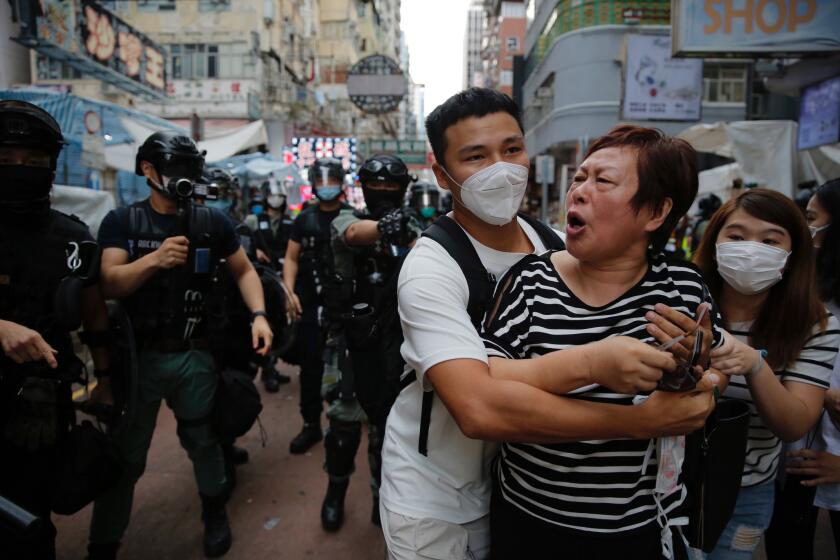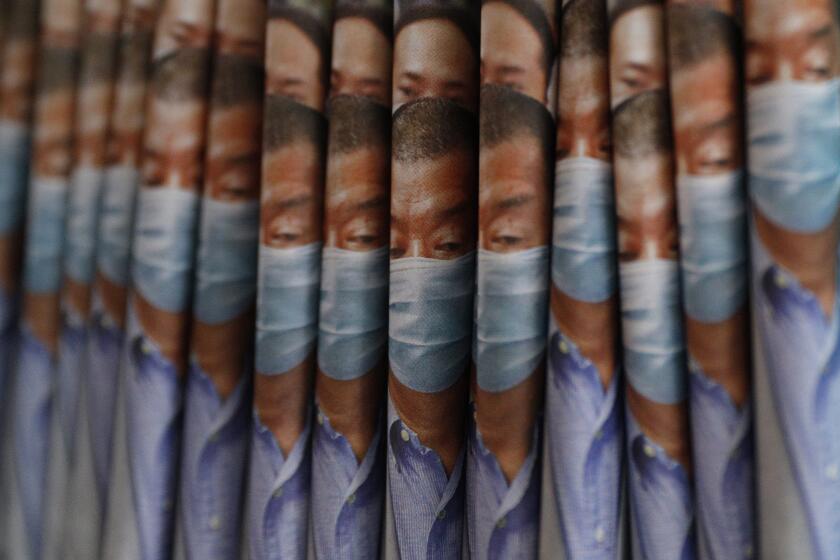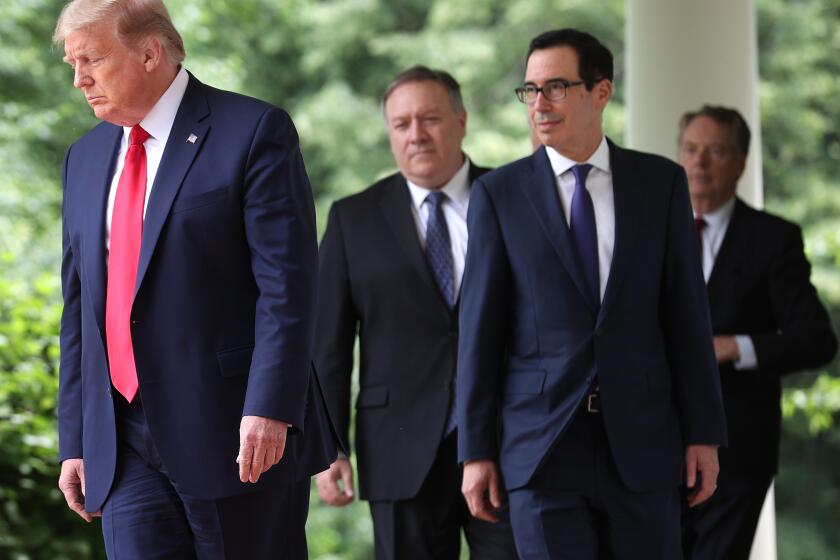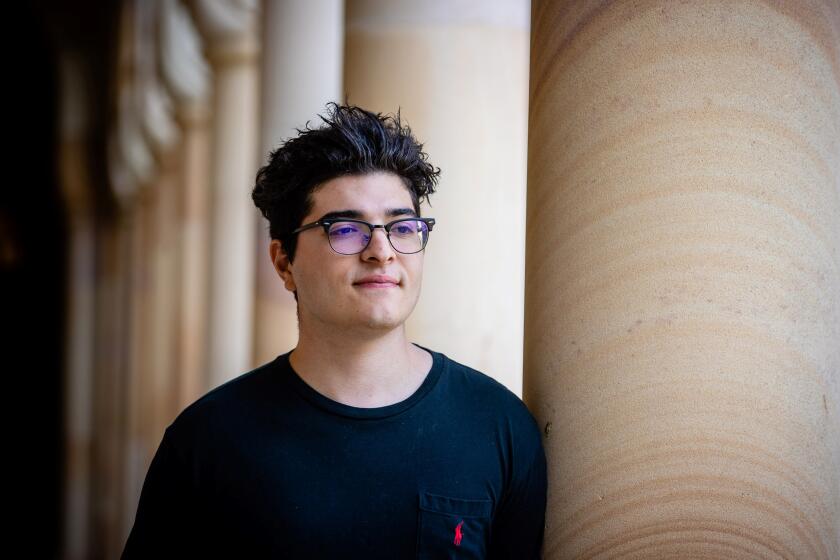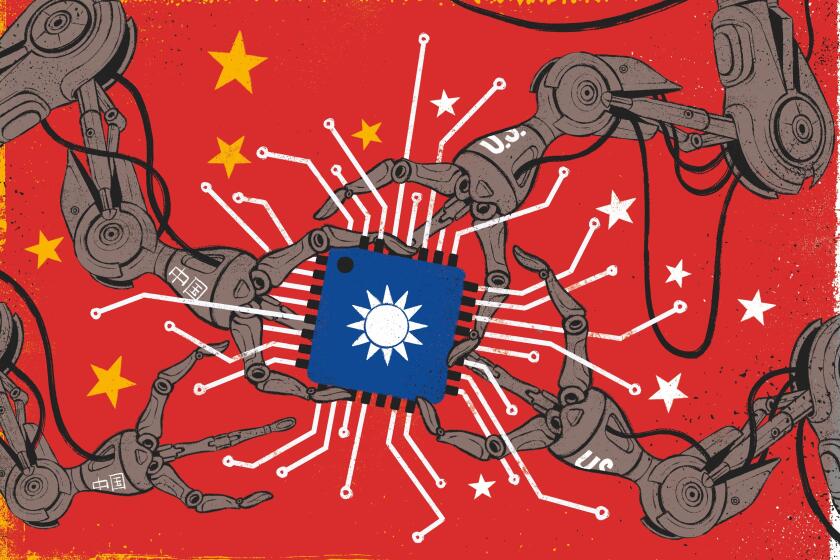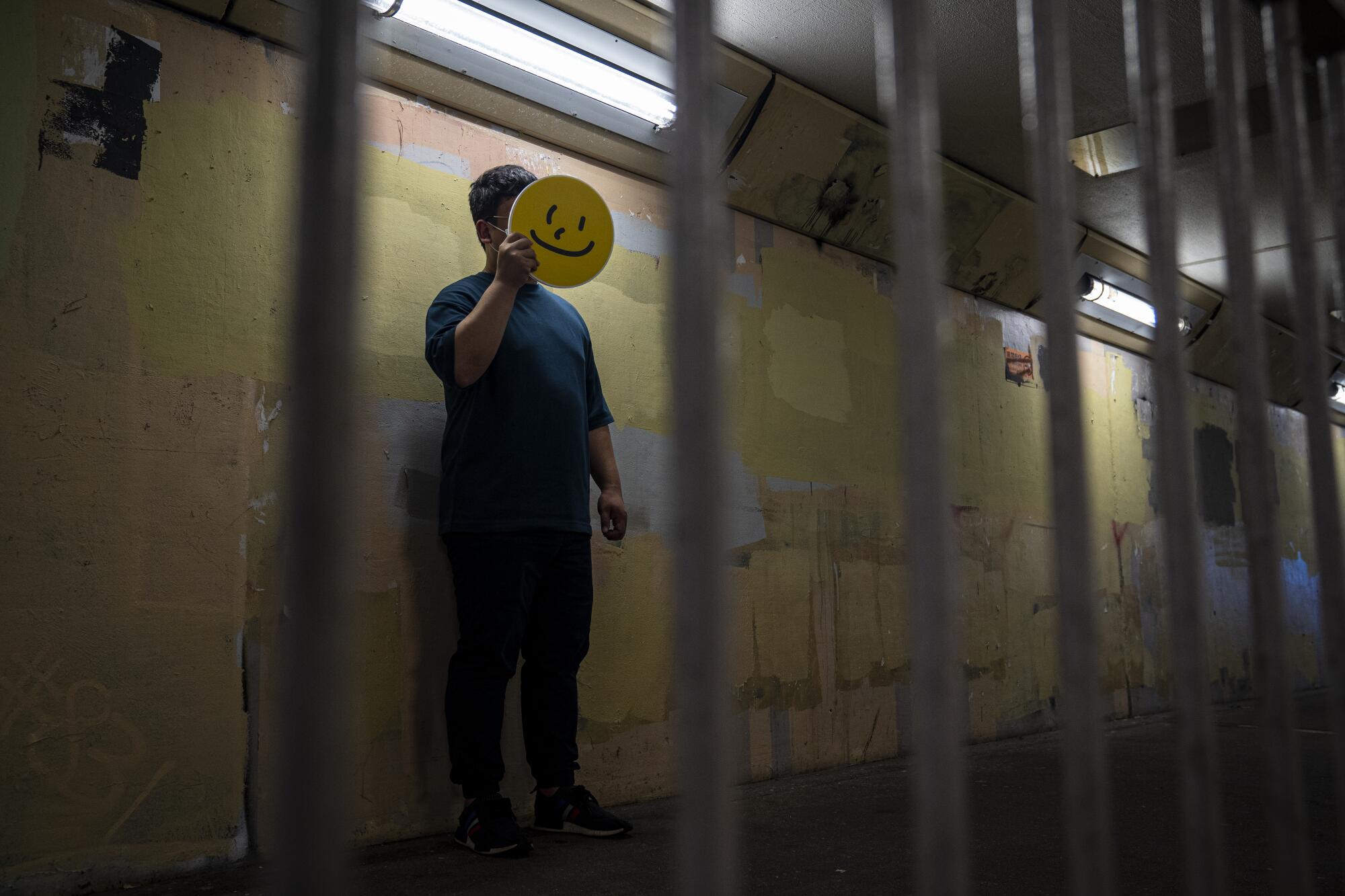
- Share via
HONG KONG — The high school visual arts teacher couldn’t go to the front lines of protest, but he took inspiration from the pro-democracy marches and unleashed his own brand of subversion: cartoons.
He drew a policeman sweeping a bloodied protester under a rug fashioned after the Chinese flag. Another sketch captioned “Lunchtime” depicted popular snacks — an egg custard tart and deep-fried French toast — next to a canister of tear gas. He captured the unrelenting despair that seized Hong Kongers after the demonstrations each night with an image of a man lying in bed crying himself to sleep.
Everywhere Wong looked, he saw China constricting the freedoms that had made Hong Kong an unabashed city of towering glass, raucous politics and quicksilver commerce. He drew in harrowing detail what he was losing, sharing his work on social media under the pen name @vawongsir. He thought his identity was safe. But then came the anonymous complaint to the Education Bureau that he was “publishing inappropriate illustrations online.”
Wong would end up losing his job.
“I felt powerless,” he said.
With China’s tightening control over Hong Kong, including passage of a new national security law, the territory’s pro-democracy activists, politicians, journalists and others are facing a Communist Party determined to crush dissent. Perhaps the greatest threat from this new purge — one that will affect generations to come — is the increasing pressure on schools and teachers over what to put in the minds of students. Both activists and bureaucrats know that a nation’s soul is distilled in the classroom; history can be erased with the silencing of teachers and rewriting of textbooks.
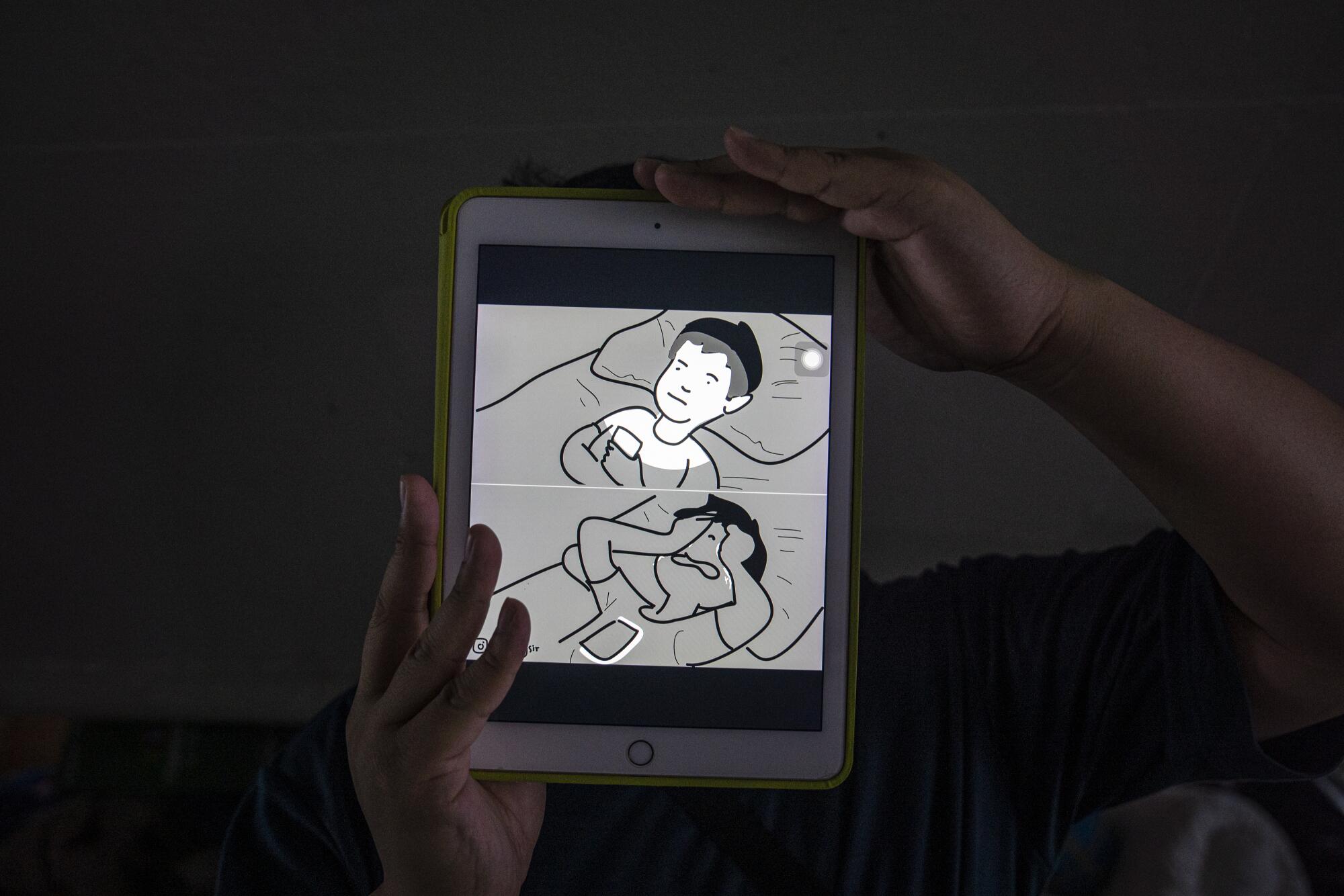
“They are turning education into a tool for controlling thought in Hong Kong,” said Ip Kin-yuen, a pro-democracy lawmaker representing the education sector who is vice president of the Hong Kong Professional Teachers’ Union. “There are a lot of cases of teachers being wronged, facing exaggerated accusations. I would describe it as political persecution.”
Hong Kong is being remade before the world. Chinese leader Xi Jinping is capitalizing on his country’s economic power and the planet’s preoccupation with the coronavirus to rein in Hong Kong’s democratic ambitions. Xi wants to subsume this defiant territory into his vision of national unity, even as China faces diplomatic fallout, most notably from the Trump administration, which has drawn closer to a new Cold War with Beijing in a fraught time of high-tech surveillance, shifting supply chains and America’s fallen stature of a global leader.
It is this city of 7 million at the center of a great power rivalry — where China sees its future and the West is in danger of losing a vital nexus in the Pacific Rim — that will determine the fate of teachers such as Wong, 30, who was too scared of retribution to give his first name. As an authoritarian makeover takes root, he and many others feel they have no place in the classroom.
It’s unclear how many teachers have been disciplined or let go for their political views. The Education Bureau said it received 222 complaints about teacher misconduct in the 12-month period ending in June. Of them, 117 were substantiated, resulting in reprimands or warnings for nearly half. The remaining half are under review. The bureau declined to disclose the nature of the complaints.
Wong was one of those complaints. Months after his cartoons began appearing on social media, officials at his secondary school, considered one of the best in the city, demanded to know if he was running the account. They prodded him about his political views. Wong sought legal advice and the school backed down.
Months passed without a resolution. Wong continued to teach his group of 10 students, who knew he was behind the drawings but never mentioned it. Then on the last day of June, hours before the new national security law was introduced dismantling Hong Kong’s democratic freedoms, Wong was summoned to the principal’s office. He was told the school no longer had the resources to renew his contract.
Dispirited and unable to push back, Wong went home that night and reposted a drawing of a teacher with a hand clasped over his mouth. On a blackboard behind him were the words, “Goodbye, students.”
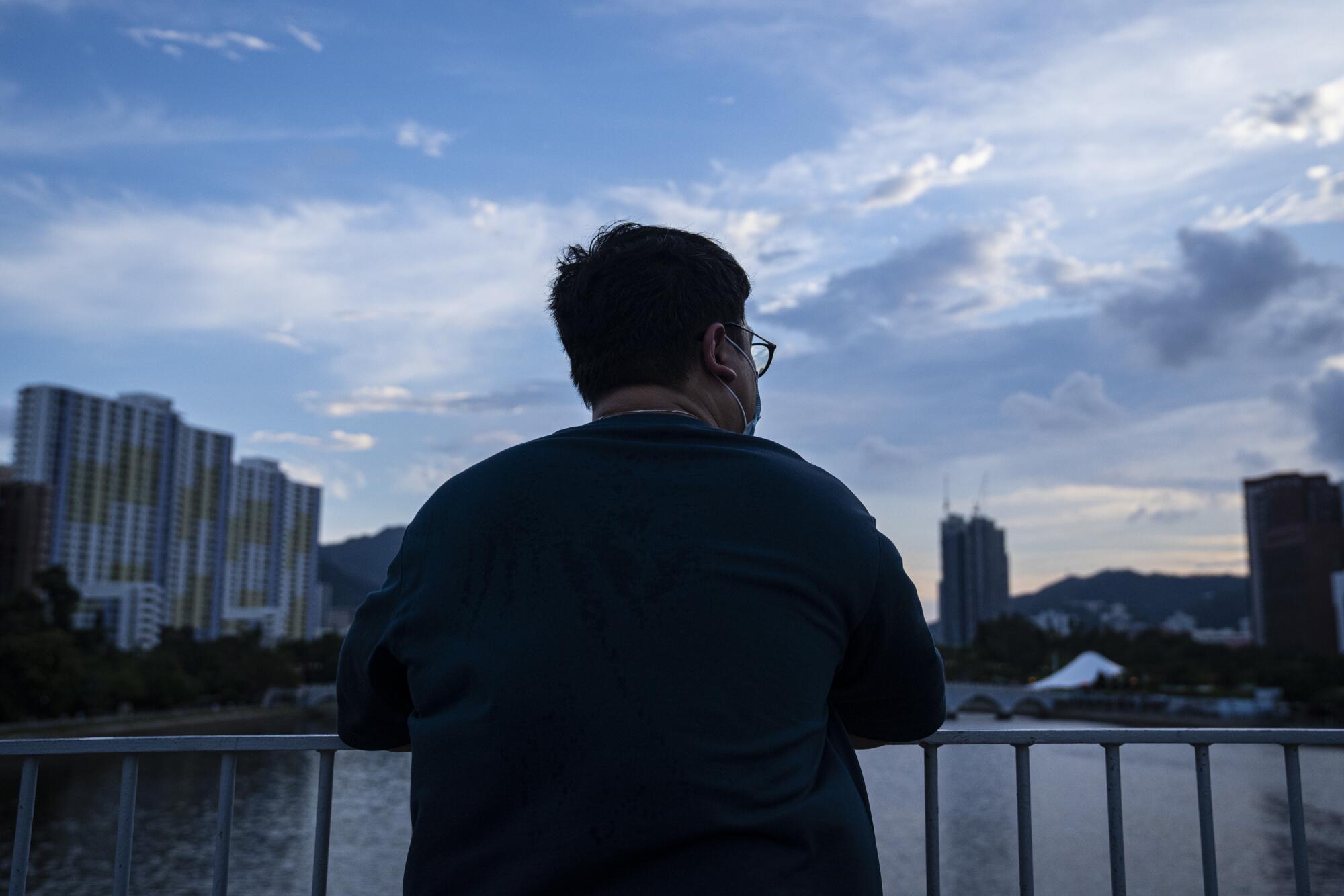
“The biggest pity is losing my students. They are always my top priority,” said Wong, still overcome with guilt for not protesting earlier alongside his pupils, including one who was arrested for demonstrating.
“Why is this their responsibility?” he asked. “Why do they have to take up this burden and be repressed for speaking up against injustice when they could have been playing basketball or video games and eating fish balls and siu mai? As a teacher, I was very ashamed that, at a time of a danger, I wasn’t there to protect my students.”
Wong, who remains unemployed, was so desperate to retain his job in order to pay for his ailing mother’s medical bills that he offered to work for half his $46,000 salary. The school declined, and Wong had no recourse.
He was not alone. In June, a middle school music teacher’s contract wasn’t renewed after she failed to prevent students from performing a protest anthem during midterm exams.
Hong Kongers are preparing for a new reality as China moves to impose new national security powers over Hong Kong that are seen by many as a “death knell” for the former British colony’s freedoms.
Another teacher at the prestigious Diocesan Girls’ School was also denied a new contract after he was investigated by the school for his role in pro-democracy demonstrations. The liberal studies instructor was partially blinded in one eye after reportedly being shot by a police projectile while attending a protest last year.
Educators say they work under a cloud of fear, subject to arbitrary complaints from surreptitious minders policing classrooms. One lawmaker suggested installing surveillance cameras in every school to monitor teachers to see if their speech constitutes subversion of the state.
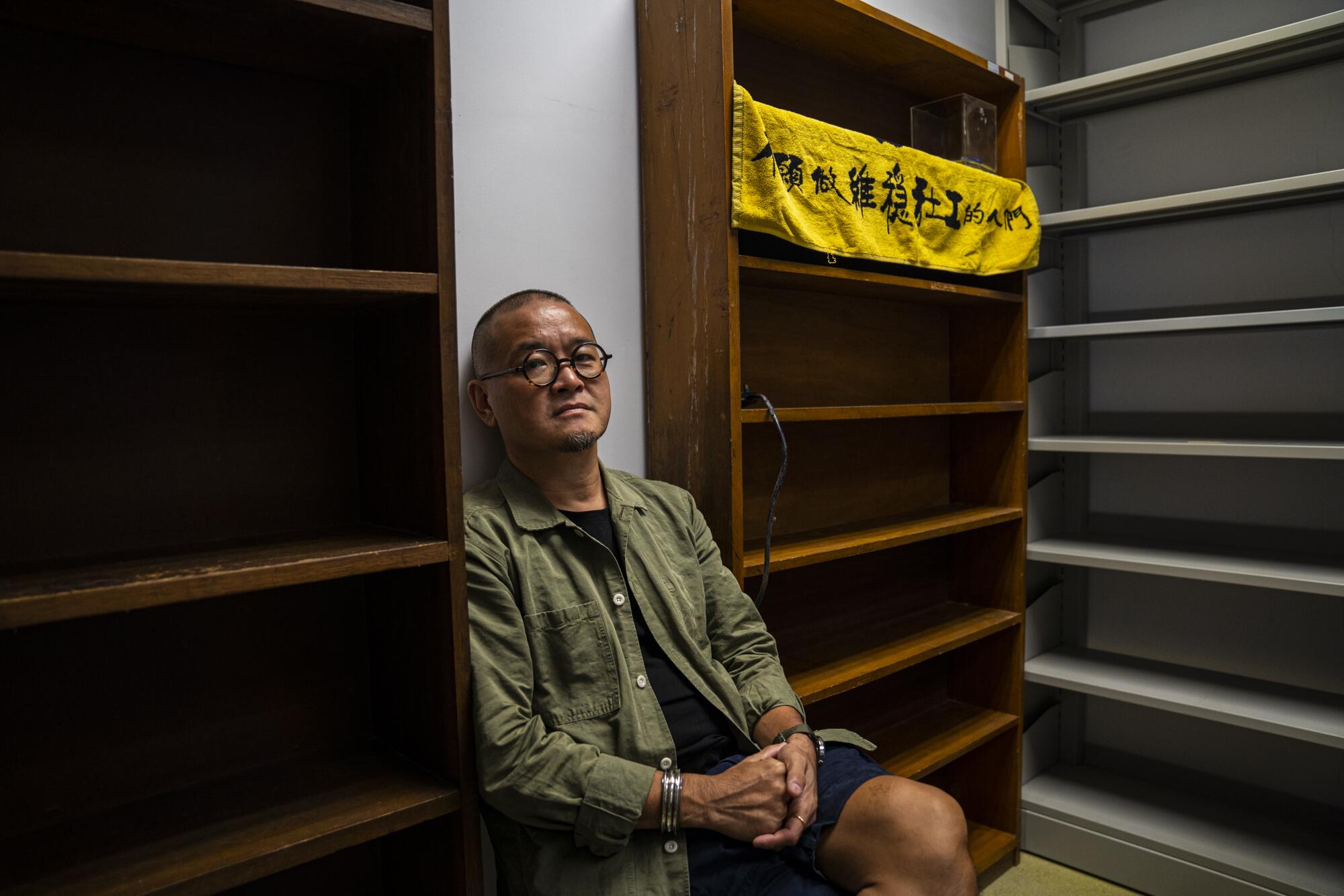
Two university educators known for their political activism, Benny Tai and Shiu Ka-chun, say their institutions were pressured to fire them in July. Afterward, China’s Liaison Office in Hong Kong hailed the terminations as a “purification of the teaching environment.”
The harm to Hong Kong’s reputation for educational freedom has been swift, with academic associations around the world ruling out the city for future conventions and seminars.
Hong Kong’s dramatic transformation from a largely free society to one that more resembles the tightly controlled mainland wasn’t expected to fully take place until 2047 — the end of a 50-year period from when Britain returned the territory to China in 1997 under a special arrangement known as “one country, two systems” that was supposed to guarantee Hong Kong a high degree of autonomy.
But the arrangement grew increasingly incompatible with an emboldened China led by Xi. The president’s grand ambitions for a rejuvenated Chinese nation could not abide challenges to Beijing’s authority from a former European colony on China’s doorstep. Confrontation with the United States under President Trump has only hastened the change.
The Chinese government may be threatening, but it doesn’t excuse the moral failure of the university and intellectuals.
— Shiu Ka-chun, recently dismissed university educator
The national security legislation — which threatens violators with life in prison for acts of secession, subversion, terrorism and collusion with foreign forces — targets anyone who opposes the Chinese Communist Party’s will.
The law has been used to arrest government critics such as media tycoon Jimmy Lai and his sons, and to disqualify anti-establishment candidates from legislative elections. Its chilling effect resulted in the cancellation of a prayer campaign for democracy by a local Catholic group. More consequentially, it’s altered behavior. Self-censorship abounds. Critical thought is being forced underground. The mass protests that captivated the world a year ago have largely fallen silent.
Shiu, one of the recently dismissed college educators, said former colleagues at Hong Kong Baptist University now shun him for fear of angering the government. One former co-worker invited Shiu to lunch but insisted on meeting at a restaurant far from campus to avoid being seen.
“You’d think I was having an affair,” said Shiu, who served six months in jail for his involvement in the 2014 Umbrella Movement protests.
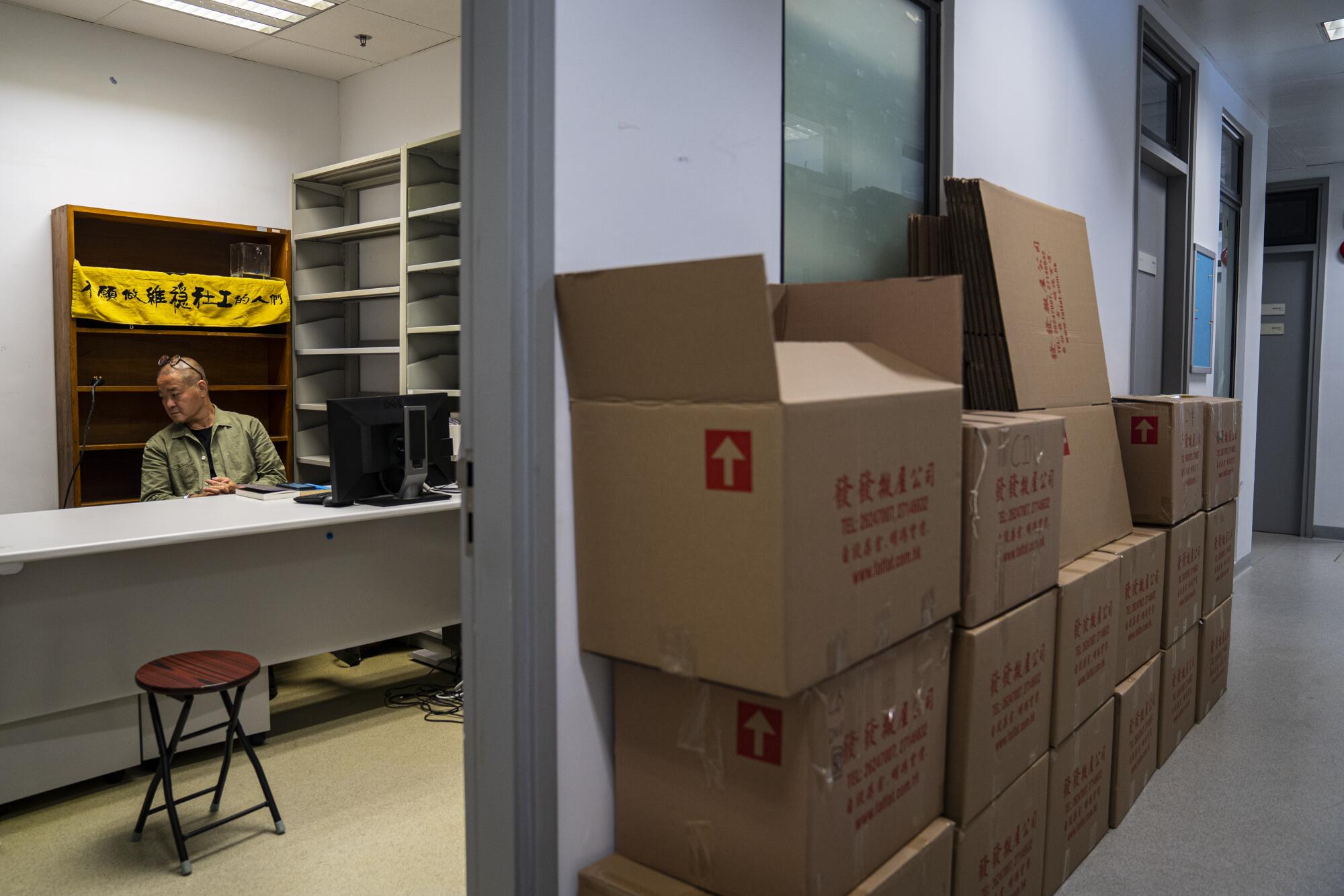
His former colleagues “are now accomplices in the crackdown,” he said. “The Chinese government may be threatening, but it doesn’t excuse the moral failure of the university and intellectuals. When you see your co-workers giving in one by one, it is not just loneliness you feel. It’s heart-wrenching.”
The repressive law also points up China’s failure — after years of economic incentives and patriotic appeals — to convince millions of independently minded Hong Kong residents that their lives would be better under mainland rule.
Stubborn resistance to China’s lure is often blamed on foreign influence, especially the city’s schools and universities, which have been accused of radicalizing youths with Western ideals and preventing a Chinese national identity from flourishing.
“The government believes that young people were against the government because they were incited by others,” said Ip, the pro-democracy lawmaker and union official. “They need to justify this narrative, so they blame the large number of arrested teenagers on the education system, the teachers, the teaching materials, the curriculum, even the public exams. Teachers essentially became scapegoats.”
Hong Kong’s staunchly pro-Beijing chief executive, Carrie Lam, reinforced those claims at an education forum where she said more than 3,000 of the 7,500 people arrested for participating in illegal protests over the last year were students. Of them, nearly half were younger than 18.
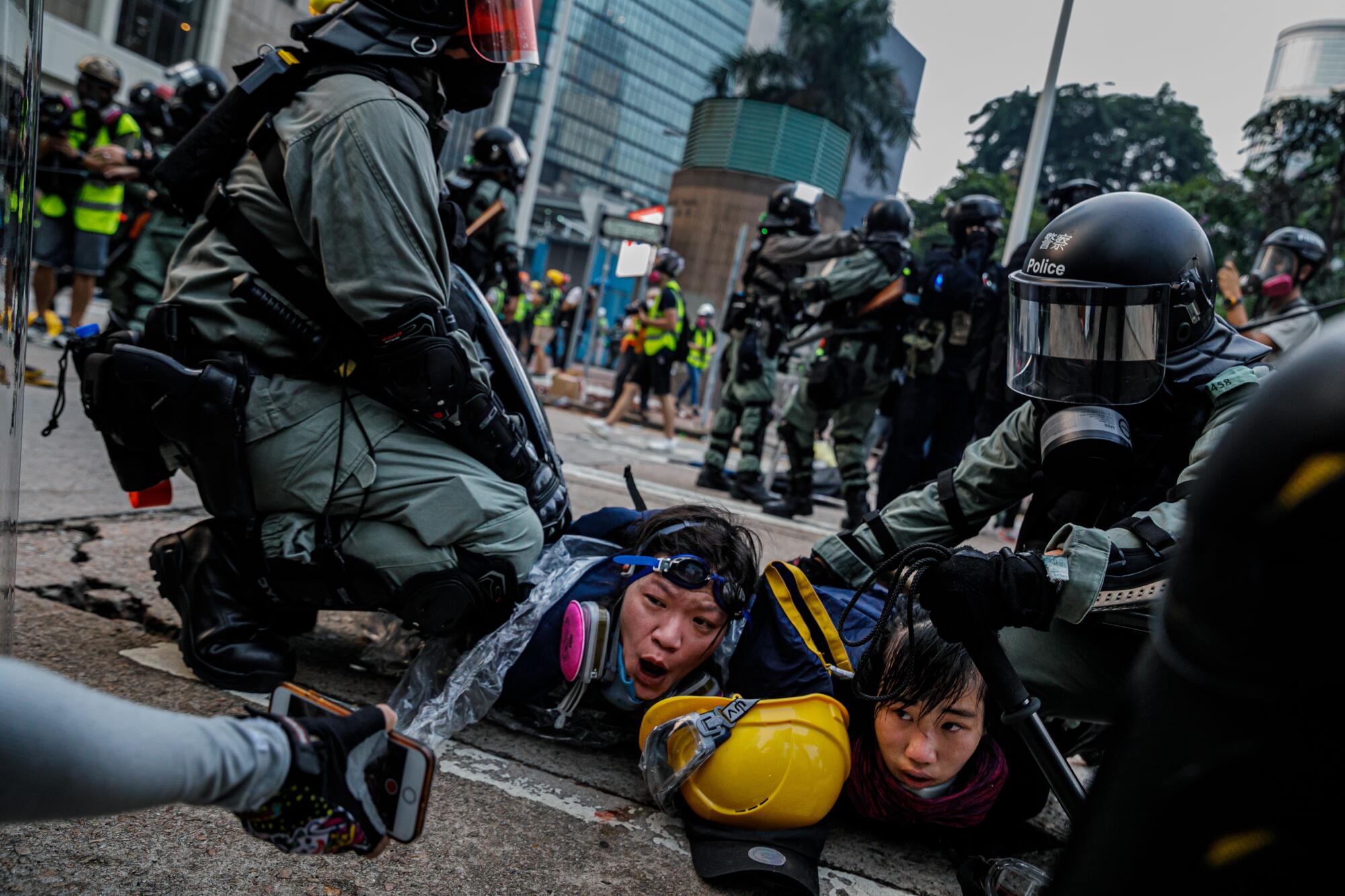
“It is extremely worrying that anti-government and anti-country thoughts have been planted in the hearts of the youth,” Lam said. “We cannot help but ask, ‘What has gone wrong with Hong Kong’s education?’”
The chill on academic freedom harks back to the Cold War era, when students and teachers in Hong Kong were forbidden to discuss politics by order of the British colonial government. Mao-inspired communist ferment was spilling over from across the border, agitating the local population and leaving authorities on edge. It wasn’t until the 1970s that the British began to loosen control.
Hong Kong’s young minds would be far easier to mold in Beijing’s vision if the colonial structure were still in place. But the city’s education system maintains an independent and progressive tradition that dates to the waning days of British rule, when educators were given freedom to develop their own curriculum.
“The fact that Beijing has a problem with Hong Kong’s education system is confirmation that Britain did not leave behind a legacy of colonial education. Instead, it left behind a legacy of a liberal education, one that encourages free and critical thinking,” said Steve Tsang, director of the SOAS China Institute at University of London.
That gave rise to a generation of politically minded youth responsible for leading protests in 2012 against a patriotic education plan and in 2014 during the pro-democracy Umbrella Movement. When protests erupted last year, students were again front and center, staging walkouts and human chains and barricading themselves on campuses.
Authorities are moving fast to prevent repeats of such behavior. Hong Kong’s Education Bureau said expressing anti-government opinions or participating in protests will result in discipline.
Meanwhile, teachers are expected to undergo mandatory training to integrate the national security law into their lessons. Textbooks are being modified so that liberal studies material no longer mentions “separation of powers” or political organizations formed by activists. Descriptions of clampdowns on freedom of speech have been replaced by passages about economic opportunities China has provided Hong Kong. Politically sensitive books, including those written by pro-democracy leader Joshua Wong as well as titles related to the Tiananmen Square massacre or the Cultural Revolution, are being pulled from library shelves.
“Many young minds are corrupted for years, but now with the national security law, the government can supervise, regulate, manage and promote [national security] through different channels,” Hong Kong’s secretary for security, John Lee, told the pro-Beijing newspaper Ta Kung Pao recently. In the same interview, he called for the removal of “bad apples” from schools.
Support for Beijing in Hong Kong is by no means scant, a reflection of the decades China has spent cultivating influence since the days of British rule. Though still in the minority, many welcome the crackdown on protesters and their sympathizers. One group formed in May to monitor schools, teachers and learning materials said it has recruited 800 volunteers, including parents, teachers and students.
“We ask the informants for evidence and verify with the schools,” said David Cua, who heads Help Our Next Generation. “If children are unknowingly contaminated [with anti-government thinking], shouldn’t teachers face the punishment they deserve?”
Teachers beginning their careers under the new restrictive climate say they’re paralyzed with anxiety about saying the wrong thing.
Brian Chan said he’s already having misgivings about teaching liberal studies, a controversial course in secondary schools designed to foster critical thinking that both the local and mainland governments have attacked for inciting students to protest. Chan wants the freedom to teach his students about current events truthfully, especially now, when so much misinformation is available online. But he fears that when it comes to China and Hong Kong’s recent history, his students will be fed a sanitized version of events.
“I’ll treasure the time I have teaching, but I have to prepare for the worst,” said Chan, 23, who was about to start his first full-time teaching job this year until the pandemic closed the city’s schools. “The room for academic freedom is diminishing.”
Last week marked the end of U.S.-China engagement. The two powers may now be sliding toward a severance of relations and even outright military conflict.
A primary school teacher surnamed Tang, who declined to use her first name over fears of being reprimanded, said her employment was placed under review after a parent complained that she had asked her students to comment on the necessity of a national security law.
“I have to make them understand what politics is,” Tang said about her students. “And I try to offer them more while I still can and let them debate these topics as much as they can because they won’t have the opportunity to do so in the future.”
Tang, who is in her 20s, always sought to make her classroom “a second home” for her students. She decorated the room, stocked it with board games and organized her schedule so she could spend time with her students during recess.
As the COVID-19 pandemic forced schools to close in January, Tang turned to a digital classroom. Each day, she posted stories, games and news articles. She shared documentaries produced by the city’s public broadcaster, including one that drew parallels between the 1989 Tiananmen Square crackdown and the Polish Solidarity movement.
The feedback had been positive. One parent, who was vehemently against the Hong Kong protests, still thanked Tang for investing in her child. Another, an immigrant from mainland China, said the news articles helped the family understand and better integrate into Hong Kong society.
In a way, they are successfully brainwashed.
— Tang, a primary school teacher who declined to use her first name
As the protests intensified, the school repeatedly reminded Tang and her colleagues to be careful about what they said. Unfazed, she continued to push her students to discuss sensitive current events, including the national security law.
After a complaint from a parent was made to the government authorities, the school called Tang in for questioning and issued a letter to the parent apologizing for the error.
“When they remove all other information they deem sensitive, the official line becomes the only thing the [students] know,” Tang said. “In a way, they are successfully brainwashed.”
Tang’s digital classroom has since been shut down, and she was suspended until further notice. A Chinese flag, usually raised only once a month at her school, now permanently waves at the top of a pole.
This is the first in a series of occasional articles about the effect China’s global power is having on nations and people’s lives.
Times staff writer Pierson reported from Singapore and special correspondent Cheung from Hong Kong.
More to Read
Sign up for Essential California
The most important California stories and recommendations in your inbox every morning.
You may occasionally receive promotional content from the Los Angeles Times.
